News
SK Inc. Invests in Fulcrum BioEnergy to Accelerate Production of Low-Carbon Fuel from Waste
More News
For the Press
U.S. Media Contacts
Joe Guy Collier
347-899-1587 Tel
joeguycollier@sk.com
Press Kit
General information and other materials are available for members of the media. Download our media fact sheet.
